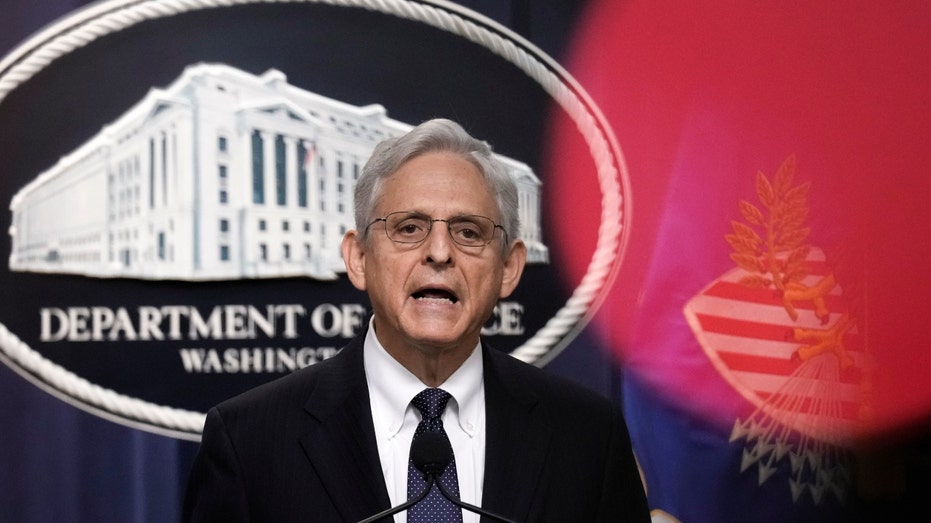Silicon Valley Bank collapse under investigation by Justice Department
Biden administration probing stock trades made by Silicon Valley Bank's financial officers days before liquidity crisis, collapse
Silicon Valley Bank fall: Former Fed official says he would have pressed harder for a private sector solution
Former Federal Reserve Vice Chair Randal Quarles gives his take on the Fed's reaction to collapse of the Silicon Valley Bank on 'Kudlow.'
The Biden administration is gearing up to investigate the collapse of Silicon Valley Bank, which was the 16th-largest bank in the United States before it went under after a run on the bank last week.
The Justice Department is in the early stages of investigating SVB's failure, Fox News has confirmed. The news was first reported by the Wall Street Journal, which said the Securities and Exchange Commission is also investigating.
These inquiries may or may not lead to charges or allegations of wrongdoing and are typical of the government's response after a big company reports massive, unexpected losses.
SVB suffered $1.8 billion in losses last week as it faced a liquidity crisis caused by bad investments in bonds. The bank's share price fell 60% last week and the Federal Deposit Insurance Corporation (FDIC) stepped in Friday to take over the bank's operations as depositors panicked and rushed to withdraw their money.
| Ticker | Security | Last | Change | Change % |
|---|---|---|---|---|
| SIVB | NO DATA AVAILABLE | - | - | - |
The government probes will look into stock sales that SVB Financial's officers made days before the bank collapsed, according to the Journal. The Justice Department's investigation reportedly involves federal fraud prosecutors based in Washington and San Francisco.
SVB COLLAPSE: MOODY'S FLAGS SIX OTHER BANKS WITH CONCERNING CREDIT RATINGS

An FDIC sign is posted on a window at a Silicon Valley Bank branch in Wellesley, Mass., on Saturday, March 11, 2023. (AP Photo/Peter Morgan / AP Newsroom)
A spokesperson for the SEC would not confirm the investigation but referred to SEC Chair Gary Gensler's Sunday statement, which said, "we at the SEC are particularly focused on monitoring for market stability and identifying and prosecuting any form of misconduct that might threaten investors, capital formation, or the markets more broadly. Without speaking to any individual entity or person, we will investigate and bring enforcement actions if we find violations of the federal securities laws."
SVB's collapse was the second-largest bank failure in U.S. history and the largest since Washington Mutual went under in 2008. As of last year, the bank held $209 billion in assets and $175.4 billion in deposits, according to the FDIC.
SILICON VALLEY BANK COMMITTED ‘ONE OF THE MOST ELEMENTARY ERRORS IN BANKING,' LARRY SUMMERS SAYS

The Justice Department, led by U.S. Attorney General Merrick Garland, is reportedly investigating Silicon Valley Bank's collapse. ((Photo by Drew Angerer/Getty Images) / Getty Images)
Prior to its failure, SVB mainly serviced tech startups and their investors. As the tech industry grew, so too did SVB's deposits, increasing 86% in 2021 to $189 billion.
But concerns over the bank's health prompted a run on deposits last week. On Thursday, customers attempted to withdraw $42 billion — nearly a quarter of the bank's total deposits — which the bank simply did not have available. SVB had tied up most of its funds in treasury bonds and other long-term investments, which have declined in value as the Federal Reserve has raised interest rates to combat inflation in the past year.
SILICON VALLEY BANK COLLAPSE: HERE'S WHO BENEFITTED FROM THEIR EXECUTIVE, PAC DONATIONS

Igor Fayermark, right, from the Federal Deposit Insurance Corporation (FDIC), exits Silicon Valley Bank's headquarters in Santa Clara, California, on Monday, March 13, 2023. (AP Photo/Benjamin Fanjoy / AP Images)
Securities filings show that SVB CEO Greg Becker and CFO Daniel Beck each sold shares in their bank the week before it collapsed. The Journal reported that Becker exercised options on 12.451 shares on Feb. 27 and sold them for $2.3 million.
Beck sold a little more than $575,000 worth of shares on Feb. 17, which was roughly one-third of his total stake in the company.
GET FOX BUSINESS ON THE GO BY CLICKING HERE
However, both sales were scheduled 30 days in advance under 10b5-1 plans, which allow insiders to schedule share sales to allay suspicion of illegal trading. "The SEC recently tightened rules for the plans, which include a 90-day waiting period before sales can be executed. The new rules went into effect on Feb. 27, the same day the executives sold," the Journal reported.





















